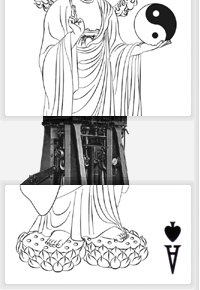今天收到Letters from China網主的電郵,才知道我們的反共文豪居然被人「陷害」了兩次--兩次都是被控偷竊,而兩次都無罪釋放。一次我曾經提及,而另一次則在這裡:
女皇訴古德明(譯音)
往事並不如煙
標籤:
倉海君
訂閱:
發佈留言 (Atom)

今天收到Letters from China網主的電郵,才知道我們的反共文豪居然被人「陷害」了兩次--兩次都是被控偷竊,而兩次都無罪釋放。一次我曾經提及,而另一次則在這裡:
女皇訴古德明(譯音)


5 留言:
He's got sticky fingers!(節錄)
说‘偷’的英文动词甚多,常见的是steal、pinch、pilfer;说得婉转一点是lift(举起)、acquire(取得)、borrow(借)、find(找到)、obtain(得到)、appropriate(收归己用)等,婉转的不看上下文恐怕难以明白,例如:He hurried away after “finding” a wallet at the mall(他在购物中心‘找到’一个钱包之后,匆匆离去)。此外,还有deprive someone of something(剥夺某人一些东西)、relieve somebody of something(减轻某人一些负担)、help oneself to something(自助式取走某些东西)、make away / off with something(取了某些东西走)等。Half-inch(半英吋)则是上述pinch的谐音。“I half-inched it,” laughed the Monkey King即‘猴王笑道:『我顺手拿走了。』’
偷窃的行为,英文叫theft,小偷则是thief。Thief的谐音说法是tea leaf(茶叶),例如:The tea leaf was prosecuted for the theft of a handbag (那个三只手被控偷窃手提包)。
作者:古德明(香港
http://www.wwenglish.com/epaper/en/1/11318.htm
婉轉語就有這好處:幹了壞事,還能照樣理直氣壯,俯仰無愧。也難怪強國可以肆無忌憚地「解放」弱國了。
Comment on Koo Tak Ming’s charge of theft in 1983
I received a call from 倉海君 yesterday inviting me to read the judgment R v Koo Tak Ming Criminal Appeal NO.839 of 1983. He was very anxious to know how Koo’s conviction was quashed by the appeal court. Though my knowledge in Law is very limited, I wish to share my humble opinion with you all in this blog.
Other than his hiring one of the most brilliant counsel, Mr Henry Litton Q.C. as he then was, to represent him, I am opined that Koo’s appeal was allowed mainly because on the face of the evidence before the appeal court, it would be ‘unsafe’ to enter a conviction against Koo soley on sole reliance of the evidence of the 3 university students (3 prosecution witnesses), that was later revealed to be deliberate lie.
First of all, I wish to point out that according to the English Criminal Law, entrapment is never a defence as illustrated in the English leading authority R v Sang [1979] 3 WLR 263. Had it been otherwise, the police would then have great difficulty in fighting crimes with the use of underc0ver agent being strictly prohibited. So in Koo’s case, it was not the manipulated entrapment between the students against him that resulted in his conviction being unsafe. But because the later admitted fresh evidence, a report allegedly made after the theft incident by the 3 students, pointed to an irrebuttable inference that the 3 students deliberately lied in court when they were giving evidence. In B.L.Jones’ judgment, it said:
“ Therefore PW1 was obviously not telling the truth when he denied
in cross-examination that he inadvertently left his wallet when he went
to the toilet, and had not left it deliberately. PW2 was also lying when
he testified that he was merely browsing in the library.”
Being a witness, prosecution and defence alike, his credibility is the most important thing of all. In a defence witness’ scenario, if he or the accused is deliberately telling a lie in court, of which is in relation to the crime alleged and being the result of realization of guilt, that lie alone could be an inference to guilt. In a prosecution witness’ scenario, if he is found lying, that would result in the judge attaching no weight to his evidence at all. Moreover, if the prosecution witness evidence is found to be a bare lie, the prejudicial effect of the said evidence would outweigh its probative value and any prudent trial judge would not consider it at all. That explains why in the judgment, the appellate judge in his obiter dictum, commented “Quite clearly the appellant would have been acquitted if the additional evidence had been before the learned Magistrate.”
In my humble view, what the appellate judge meant here was only, had the Magistrate earlier found the 3 students for the prosecution were lying, Koo would not acquitted; but not had the Magistrate discovered the 3 students were entrapping Koo, Koo would never be convicted. But for the deliberate lies of the prosecution witnesses, whatever their content was, the prosecution case against Koo was not proved beyond reasonable doubt.
One last point I note by reading the judgment was, it seemed his Lordship was of the opinion that these 3 HKU students were framing Koo, rather than merely entrapping him. My deduction was reached by reading the last paragraph of the judgment saying;
“Having regard to the serious miscarriage of justice caused
by the students I shall order that the papers he forwarded
to the Attorney-General to consider whether any proceeding
should be taken against them.”
So his Lordship simply believed the 3students’ deliberate lie had resulted in an innocent soul being wrongfully prosecuted, he seemingly thought even the content contained in the report was unbelievable as well.
Besides it is always the golden rule of Evidence Law of not admitting statement made outside court as evidence. By making a report saying A but choosing to say B in the witness-box, it would render the out of court statement being inadmissible as evidence to prove truth.
I wish 倉海君 and other blog visitors who have interest in this case, would find the result less puzzling.
得饒人處且饒人。
左冷禪:
恭喜你終於學會留言,也謝謝你詳盡的意見。
小藍:
明白。謝謝忠告!
發佈留言